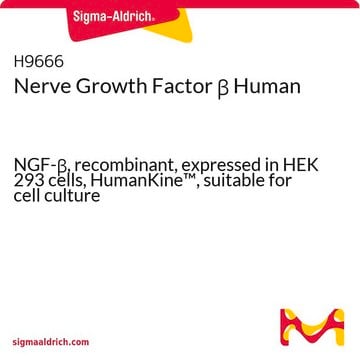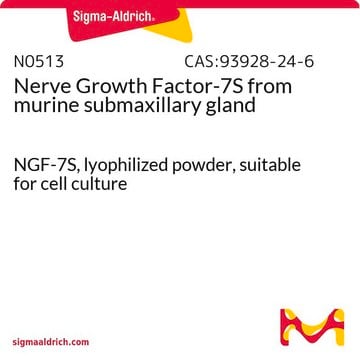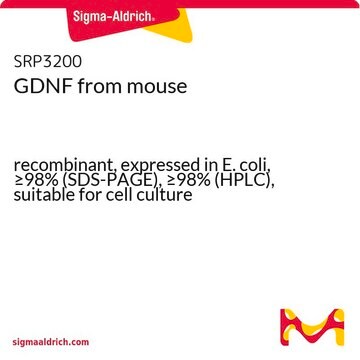N8133
Nerve Growth Factor from Vipera lebetina venom
NGF, lyophilized powder, suitable for cell culture
Sign Into View Organizational & Contract Pricing
All Photos(1)
About This Item
Recommended Products
biological source
Vipera Lebetina
Quality Level
form
lyophilized powder
potency
0.2-20 μg/mL ED50/EC50
quality
endotoxin tested
mol wt
protein 32.5 kDa
packaging
pkg of 0.1 mg
technique(s)
cell culture | mammalian: suitable
impurities
<10 EU/vial
color
white to off-white
UniProt accession no.
storage temp.
−20°C
Related Categories
Physical form
Lyophilized from a 0.2 μm filtered solution in sodium acetate buffer.
Preparation Note
Isolated from the snake venom of V. lebetina.
Analysis Note
The biological activity of Nerve Growth Factor (NGF) from Vipera lebetina venom is measured in a cell proliferation assay using PC-12 cells.
Storage Class Code
11 - Combustible Solids
WGK
WGK 3
Flash Point(F)
Not applicable
Flash Point(C)
Not applicable
Personal Protective Equipment
dust mask type N95 (US), Eyeshields, Gloves
Certificates of Analysis (COA)
Search for Certificates of Analysis (COA) by entering the products Lot/Batch Number. Lot and Batch Numbers can be found on a product’s label following the words ‘Lot’ or ‘Batch’.
Already Own This Product?
Find documentation for the products that you have recently purchased in the Document Library.
Customers Also Viewed
Geraldine Longo et al.
The Journal of neuroscience : the official journal of the Society for Neuroscience, 33(24), 10066-10074 (2013-06-14)
Although chronic pain is the most common symptom of arthritis, relatively little is known about the mechanisms driving it. Recently, a sprouting of autonomic sympathetic fibers into the upper dermis of the skin, an area that is normally devoid of
M Florencia Iulita et al.
Trends in pharmacological sciences, 35(7), 338-348 (2014-06-26)
Alzheimer's disease (AD) is a devastating neurodegenerative condition and the most common type of amnestic dementia in the elderly. Individuals with Down syndrome (DS) are at increased risk of developing AD in adulthood as a result of chromosome 21 trisomy
Tao Yu et al.
The Journal of neuroscience : the official journal of the Society for Neuroscience, 34(17), 6098-6106 (2014-04-25)
Trk neurotrophin receptor ubiquitination in response to ligand activation regulates signaling, trafficking, and degradation of the receptors. However, the in vivo consequences of Trk ubiquitination remain to be addressed. We have developed a mouse model with a mutation in the
Yu-Jung Chang et al.
Biochimica et biophysica acta, 1830(8), 4130-4136 (2013-04-16)
Neurotrophins are important regulators for neural development and regeneration. Nerve growth factor (NGF) therapy has been tested in various models of neural injury and degeneration. However, whether NGF can reach target tissues and maintain effective concentration for a certain period
Jeremy E Purvis et al.
Cell, 152(5), 945-956 (2013-03-05)
A growing number of studies are revealing that cells can send and receive information by controlling the temporal behavior (dynamics) of their signaling molecules. In this Review, we discuss what is known about the dynamics of various signaling networks and
Our team of scientists has experience in all areas of research including Life Science, Material Science, Chemical Synthesis, Chromatography, Analytical and many others.
Contact Technical Service










